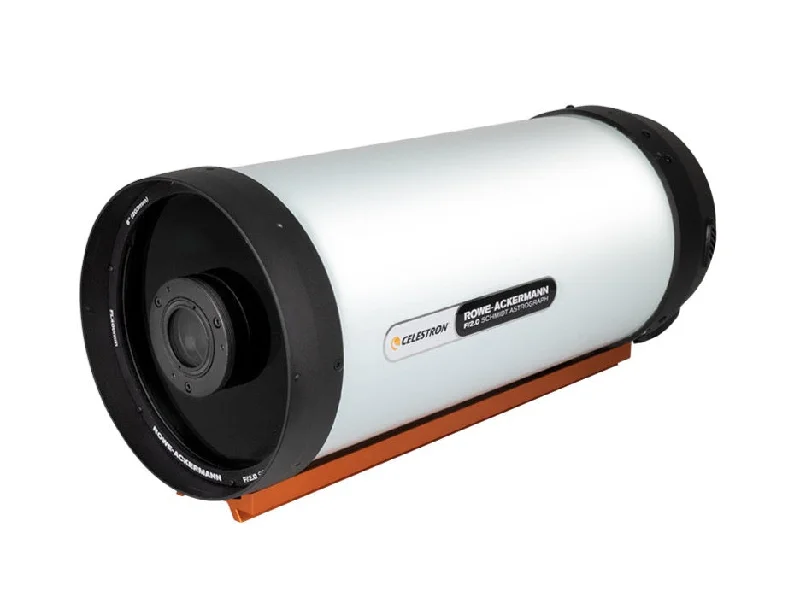- Flat field free of optical aberrations like field curvature, coma, astigmatism and chromatic aberration across an entire APS-C sensor.
- Unlike the larger RASAs that work with DSLR and large CCD cameras, the 8” model was designed with color astronomical CMOS cameras, smaller CCD cameras, and mirrorless cameras in mind. The telescope does not work with standard DSLR cameras.
- Ultra-Stable Focus System – precision linear ball bearing virtually eliminates image shift.
- Integrated air cooling system –12V DC MagLev fan reduces cooldown time and provides optimal air flow while filtering out dust.
- Internal filter mount – seamlessly accommodates a Light Pollution Imaging Filter into the optical path.
- CGE dovetail mounting rail.
- Performs over a wider spectral range than most telescopes, from 400nm – 800nm, so more of the light passing through the astrograph is in sharp focus.
Capture spectacular wide-field deep sky images in seconds with Celestron’s portable astrograph, the 8” Rowe-Ackermann Schmidt Astrograph (RASA). This incredibly fast f/2.0 system is the perfect companion to today’s color astronomical CMOS cameras, smaller CCD cameras, and mirrorless cameras. Thanks to its fast focal ratio and patented optical design, you can produce sharp, detailed images and, in many cases, skip the autoguider completely. Weighing in at just 17 pounds, it’s easy to transport your 8” RASA to the most remote dark sky locations.
RASA Performance Made for Everyone
The 8” RASA is an imaging telescope that delivers a flat field without optical aberrations for razor sharp stars across a wide field of view. It can capture stunning deep-sky astronomical images without the challenges typically presented by longer focal length instruments at a fraction of the cost of those systems.
The latest addition to the RASA family, this 8” version is a much more portable and affordable version of the heralded RASA 11, which was introduced to much acclaim in 2014. With the 8” RASA joining the lineup, a wider range of astroimagers can enjoy the benefits of the RASA design. It has many of the same thoughtfully designed features as its “big brother” RASA 11, including the integrated air-cooling system, internal filter mount, and sturdy CGE dovetail mounting bar.
Purely designed for imaging, the 8” RASA cannot be used visually. The prime focus focal plane is located at the front of the optical system, so it cannot accommodate a traditional eyepiece.
Shorter Exposure Times and Virtual “Real-Time” Observing
Since it is an F/2.0 optical system, imagers can use shorter exposure times to capture detail in faint objects. When combined with sensitive cameras and the proper “live stacking” software, the 8” RASA can provide an almost real-time observing experience. View images on a computer instantly that are brighter and more detailed than can be seen in much bigger telescopes with the naked eye.
Because shorter exposure times are possible, your equatorial mount won’t need to accurately track over extended periods. The 8” RASA’s relatively short 400mm focal length also lessens equatorial tracking demands. In many cases, autoguiding will not be required. Weighing only 17 lb, this optical tube pairs perfectly with a wide variety of mounts.
Ultra-Stable Focus System
With the launch of the 8” RASA, Celestron is unveiled a focuser design that mitigates lateral movement of the primary mirror when focusing, slewing, or tracking with the astrograph. Focusing is easier, more accurate, and more stable than ever. The key to the Ultra-Stable Focus System is a precision linear ball bearing, which is tested during assembly to ensure optimal results.
Built for Today’s Latest Cameras
Unlike the larger RASAs that work with DSLR and large CCD cameras, the 8” model was designed with color astronomical CMOS cameras, smaller CCD cameras, and mirrorless cameras in mind. The telescope does not work with standard DSLR cameras. It is optimized for sensors with up to a 22mm diagonal, but performs well with sensors up to 32mm diagonal. The APS-C sized sensors used in many mirrorless cameras are a good choice. 42mm full frame sensors will also work, but performance will be poor at the edges of the sensor and field illumination will be reduced. Additionally, we do not recommend pairing RASA 8 with any camera body more than 4” in diameter.
Please note: The RASA 8 is not compatible with DSLR cameras.
Unique Optical Design
RASA’s optical design is patented (US 2016/0299331 A1). The design consists of a Schmidt corrector, primary mirror, lens group, and optical window. The lens group contains 4 elements and utilizes rare-earth elements. Unlike many telescopes that only perform well over the visible spectrum (400-700nm), the 8” RASA’s optics are designed to perform over a wider spectral range, from 400nm – 800nm. This allows more of the light emitted from the astronomical object to be sharply focused in the image.
With many imaging systems, adding an extra piece of flat glass such as a filter does not change optical performance. However, that is not the case with super-fast optical systems like the RASA. Our engineers addressed this by designing the RASA with a removeable optical window, so you can maintain peak optical performance if a filter is added or if a camera has its own optical window. Celestron offers a Light Pollution Imaging Filter designed specifically for the 8” RASA, which mounts in place of the optical window.
All refractive optical surfaces are coated with StarBright XLT coatings, while the primary mirror uses enhanced aluminum coatings. This maintains high light transmission through the entire optical system.
When compared with “Hyperstar SCT” systems, the RASA 8 provides better optical performance and field illumination.

